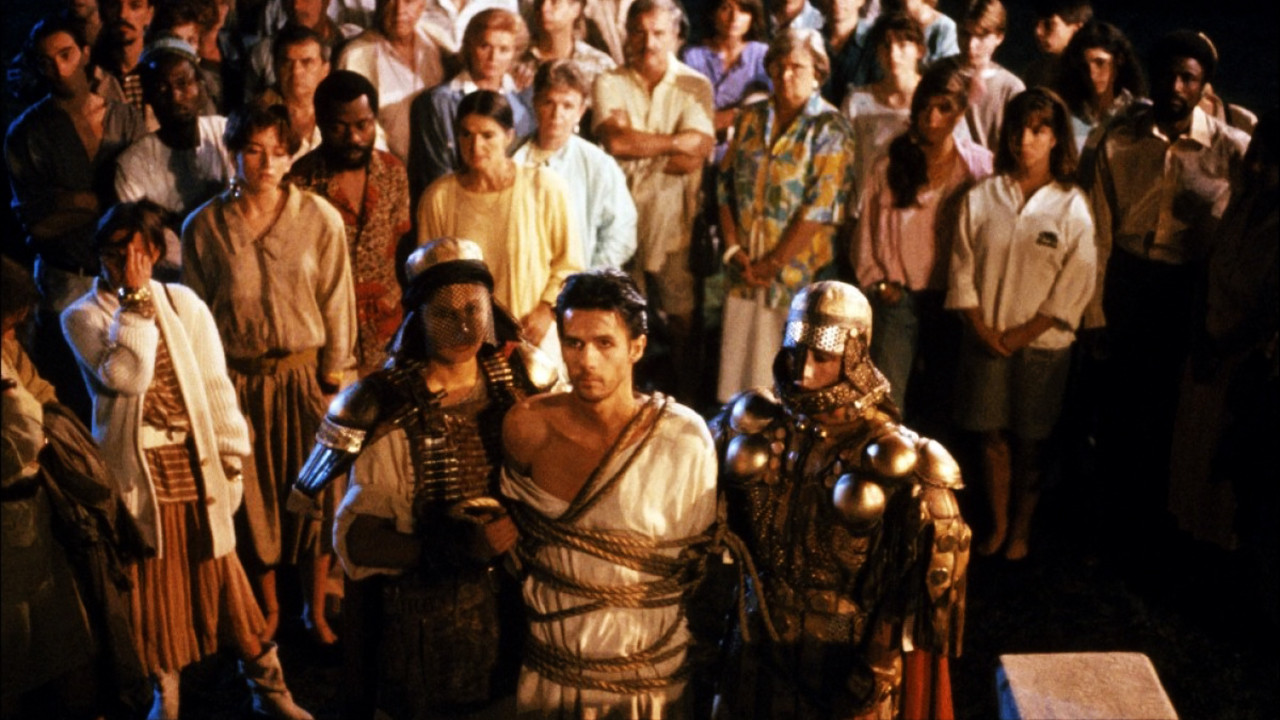In Denys Arcand’s 1989 Academy-nominated film Jesus of Montreal, allegory is treated as a not-so-subtle scaffolding with which the Quebecois director presents a cross-section of hypocritical ‘80s Quebecois culture—sexually fetishized advertising; the media’s banal, buzz-word rhetoric in narrativizing news; unfaithful priests oblivious to their own irrational cognitive dissonance—through parallels to the mythicized savagery depicted in the Bible. Structured as a play-within-a-play (or film-within-a-film, considering the popularity of Passion films), Jesus of Montreal is a sprawling modern reimagining of the Christian tale in which avant-garde theatre artists become persecuted for their modernization of the passion play.
Daniel is employed by a local priest to punch up the church’s annual production, and he goes around collecting fellow actors from their well-paying commercial gigs as if they were disciples. The priest, a spiritually conflicted man who sleeps with one of the actresses, refuses to leave the Church on the grounds that he would be a nobody (his is less an existential crisis than a financial one). He informs Daniel of the new scientific findings about Jesus’ life, which leads Daniel to research, then recreate the play as a deconstruction of the Biblical tale into a historically contextualized narrative about the many interpretations of Jesus’ life.
For example, the play notes that Jesus was likely the son of a Roman soldier and that specific details about his age and death are uncertain. The actors’ new production may not be the passion play, but it is certainly passionate—respectful of the man turned into a religious prophet and gently critical of the ways in which people have used his name. The play becomes a sensation among Montreal audiences but is ultimately censored by the Catholic Church.
In turn, Daniel becomes a martyr for his own cause of freedom of speech and compassion. He violently upturns a commercial casting call after one of his actresses is treated poorly and asked to strip for her audition. He forces the casting call staff to flee the theatre, which is reminiscent of the Jesus’ cleansing of the temple. During the last run of the play, a riot ensues among the security staff and the audience, and Daniel is wounded. He is (naturally) unable to receive care from a Catholic hospital and is then taken to a Jewish facility where he enters a permanent coma. His organs are then donated, allowing one man to continue living with a new heart, and a woman to see for the first time. His disciples create a new alternative theatre in his name, not unlike the creation of the Christian religion in the Holy Son’s name.
Jesus of Montreal is more than a clever parable—it was Arcand’s daring undoing of two opposing forces wreaking havoc on Quebecois society: an outdated religious institution deemed so irrelevant and hypocritical to young French Canadians it was driving people into the hands of commercialization. Indeed, when a friend-of-a-friend lawyer speculates on the marketing potential of Daniel’s new-found fame—being a spokesperson for non-profits or publishing his memoirs—the lawyer gestures to the streets of Montreal below them, saying “The city is yours for taking.” The lawyer is the devil, the skyscraper is the hill, and corporate opportunism is the gateway to corruption.
Arcand believes there is no salvation in organized religion or corporatism, only the hypocrisy of power structures. And yet, his film argues that faith and compassion are not dead in Montreal. While it’s quaint that a modern-day Jesus figure would go on to inspire actors into pursuing more noble artistic careers, and that his young death would enable others to continue living because of his donated organs, the titular protagonist is ultimately more symbolic of a broader, collective belief, one that optimistically argues for the continued existence and importance of spiritual faith in modern Quebecois culture without the shadow of oppressive bureaucracy.

